The Importance of Routers in a Case: A Comprehensive Guide
In today's digitally connected world, routers serve as the foundation of home and office networks. However, routers are not simply practical devices; they also feature numerous features that affect efficiency, toughness, and efficiency. One such function is the enclosed case or chassis, which is vital for safeguarding the router's hardware and making sure optimal efficiency. This post explores the significance of a "Router in a Case," describing its benefits, elements, and why it matters in the realm of networking.
Understanding Routers and Their Purpose
A router is a networking device that forwards information packets in between computer system networks. It makes it possible for communication in between various gadgets, such as laptop computers, smart devices, and printers, permitting them to share an internet connection effectively.
Key Functions of Routers:
- Data Packet Routing: Directs internet traffic smartly so that data reaches the proper device.
- Network Address Translation (NAT): A feature that allows multiple devices to share a single IP address.
- Firewall Protection: Often incorporated into routers, this feature secures the network from unauthorized access.
- Wireless Access Point (WAP): Most contemporary routers also work as wireless access points, supplying Wi-Fi connectivity.
Why Is the Case Important?
The case of a router plays a considerable function in:
- Heat Dissipation: Routers create heat while operating. A properly designed case permits ideal airflow and helps in effective heat dissipation.
- Resilience: A tough case secures internal parts from physical damage, dust, and wetness.
- Visual Appeal: A visually appealing design can enhance the look of your work space or home.
- Port Accessibility: Good cases often have tactical openings for easy access to ports and buttons.
Kinds Of Router Cases
Let's analyze the variations in router cases, focusing on product and style.
| Type | Material Used | Benefits | Downsides |
|---|---|---|---|
| Plastic Cases | High-density polyethylene | Light-weight, affordable, excellent for heat insulation | Less resilient than metal; might warp in time |
| Metal Cases | Aluminum or steel | Extremely resilient, outstanding heat dissipation | Heavier, more expensive |
| Custom-made Cases | Varied (3D printed or customized) | Tailored to the particular needs and design choices | Normally more expensive and might require time |
Benefits of Using Router Cases
1. Improved Performance
Effectively developed cases make it possible for routers to run efficiently. When heat is effectively handled, the router can preserve optimum performance without throttling speed.
2. Relationship with Signal Strength
Surprisingly, the case product can impact signal strength. Metal cases might obstruct particular signals, which can cause dead zones in Wi-Fi protection. Understanding this relationship assists users make notified choices when choosing a router.
3. Aesthetic Consideration
In the age of smooth technology, lots of customers value a router's design as much as its performance. Cases can enhance organization, specifically when provided a contemporary or complementary aesthetic.
4. Stability and Security
A robust case makes sure stability, avoiding the router from being easily knocked over or harmed, specifically in homes with family pets or kids. Some cases even include lock features for guaranteed network environments.
Important Features to Look for in a Router Case
When considering a router in a case, particular functions need to not be neglected:
- Ventilation: Look for cases with appropriate ventilation holes or mesh panels that permit heat to escape.
- Port Access: Ensure all needed ports (USB, Ethernet) are quickly available.
- Installing Options: Some cases offer mounting capabilities for wall installations, which can save space and enhance cable management.
- Modularity: A modular design can enable upgrades or changes to the router without needing to buy an entire brand-new case.
FAQs
1. Do all routers feature cases?
Not all routers include designated cases, specifically entry-level designs. However, Flachdübelfräse Test 2024 -end or organization routers might include a protective chassis.
2. Can I utilize any case for my router?
No, it's vital to pick a case that works with the particular model of your router to ensure correct fit and performance.
3. How can I enhance the heat dissipation of my router?
Consider utilizing a case developed for optimum air flow, or employ extra cooling solutions like external fans if you observe efficiency concerns due to overheating.
4. Will a metal case always be better?
Not necessarily. While metal cases offer toughness and heat dissipation, they can likewise obstruct Wi-Fi signals. It's vital to weigh the pros and cons based upon private networking needs and environments.
5. Is it worth purchasing a custom case for my router?
This depends on your specific requirements. Customized cases can offer distinct performance and style fit to private preferences, but they may be more pricey than basic options.
Understanding the role and value of a router in a case uses vital insights for enhancing your home or workplace network. With the right case, a router can perform efficiently, stay cool, and mix visually into its environment. Whether one picks a basic case or go with a tailored version, being notified about the advantages and functions can contribute significantly to a more reputable and stylish web experience.
To guarantee optimal efficiency from an invaluable tool, constantly remember that a well-protected router is also a well-functioning router.

